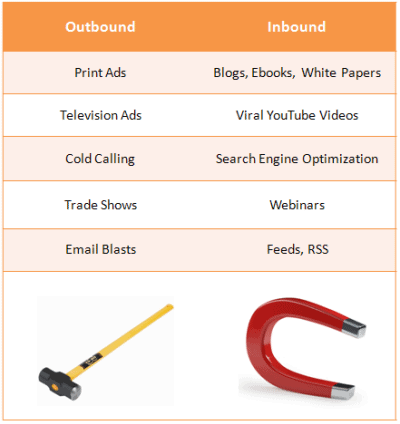Inbound or Outbound Marketing for an MSP?

I saw a post on r/msp recently, asking about whether an MSP should spend a chunk of money on inbound or outbound marketing. This question gave me pause, not because I don’t have a lot to say on the subject, but because I wasn’t quite sure where to begin. If one of my MSP clients had asked that question of me, I’d have called them back instead of writing out a reply, as I’d need an opportunity to ramble a little bit. And honestly, I’m just not sure it’s the right question to ask in the first place.
What is Inbound Marketing?
Inbound marketing is a marketing buzzword popularized by Brian Halligan, the co-founder of HubSpot. HubSpot defines it as:
The inbound methodology is the method of growing your organization by building meaningful, lasting relationships with consumers, prospects, and customers. It’s about valuing and empowering these people to reach their goals at any stage in their journey with you.
That’s awfully fluffy, self-serving, and grandiose. Yuck. I’d instead describe inbound marketing as a set of processes that encourage leads to contact you. This typically revolves around having a website that’s SEO-friendly, blogs and other content that’s compelling and add real value, distribution via organic social media, an email nurturing campaign, and the marketing automation tech to bring the whole shebang together.
Presumably, Halligan’s inspiration for the term was the distinction between inside and outside sales, a dichotomy that’d been around for decades. Inside salespeople answer calls, outside salespeople make calls. It follows that inbound marketing is all about inducing people to contact you. What is outbound marketing all about then?
What is Outbound Marketing?
Halligan defines outbound marketing this way:
Outbound marketing is a traditional method of marketing seeking to obstruct potential customers. Outbound marketing includes activities such as trade shows, seminar series and cold calling. It is costly and the ROI is much lower than inbound marketing.
This strikes me as precisely the type of definition you’d expect to hear from a monger of inbound marketing tools. Another HubSpot blog breaks down the difference between the two with this slightly outdated table:
I have some reservations about this.
Is Inbound Marketing Really Less Costly than Outbound?
Halligan says outbound marketing is more costly. I agree that tactics like print ads, TV ads, and trade shows are costly. But cold calling? It depends. If you’re a mature MSP, then yes, hiring and training sales people is costly. But the actual cold calling itself isn’t costly. And for smaller MSPs, more often than not it’s the founder doing the cold calling, so there’s no hard cost incurred at all (although there is the opportunity cost of that time). Likewise with email blasts, if you’re a mature MSP, then yes, it’s costly to pay someone to write copy, and yes, there are SaaS fees associated with email tools like HubSpot offers. But for a smaller MSP, there are no hard costs incurred from having employees write copy for emails, and an inexpensive SaaS email tool like MailChimp is suitable to send out the email blasts.
Are the tactics on the inbound side of the chart less costly? Yes and no. I agree that webinars, feeds, and RSS are inexpensive, although the latter two are a bit dated. Blogs, eBooks, and white papers can indeed be costly (or time-consuming if you’re fulfilling internally). Gaining exposure on YouTube or other social networks isn’t cheap these days either. For SEO, the basics are inexpensive to implement and will go a long way. But SEO is a competitive endeavor, and staying ahead of the pack with advanced SEO strategies requires an on-going effort and can be costly.
Generally, I’d agree that inbound is less costly than outbound, but I don’t think it’s as cut-and-dry as Halligan suggests. I also don’t think the division between inbound marketing tactics and outbound marketing tactics is all that cut-and-dry. For instance, if you’re writing blogs, eBooks, and white papers (i.e. inbound), you should probably be combining that with email blasts (i.e. outbound). I mean…a big part of HubSpot’s value proposition is facilitating that very process! And if you’re attending trade shows or seminars, and you take the leads you gathered there and add them into your HubSpot contacts database, and start nurturing them along with email blasts…is that outbound, inbound, or both?
Are Inbound and Outbound Marketing Just Buzzwords Then?
Yes, but as far as buzzwords go, inbound and outbound marketing are fairly useful concepts. It’s just how HubSpot’s own marketing pits them against each other that I don’t agree with. There’s a lot about inbound and outbound that are complimentary, and they should co-exist in an MSP’s marketing mix. The adversarial approach championed by HubSpot may further their interests in terms of communicating the value of HubSpot’s excellent inbound marketing tools, but I think it can be misleading for non-marketers, like the poster on r/msp that inspired this very blog.
How Should an MSP Identify Marketing Tactics to Prioritize?
Rather than framing the question as outbound marketing opposed to inbound marketing, I would encourage MSPs to consider the stage of growth of their company is in and which marketing tactics make sense for that stage. To realize success with your marketing, you’re going to need to have a multi-faceted approach including elements of both inbound and outbound anyway. Viewing it through the lens of stage of growth is a more useful model to understand your MSP’s marketing priorities than any buzzword-ladened framework. And by golly, wouldn’t you know it, I’ve already written another blog on that that exact topic! Lucky you!
eBridge is a certified HubSpot partner agency. Please contact us if you’re interested in assistance with your inbound or outbound marketing needs for your MSP.
Posted October 7, 2020
Categories: Advertising and Marketing General
Tags: HubSpot, inbound marketing, msp

